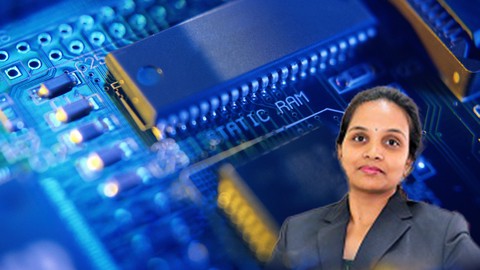
Capture/Compare/PWM(CCP) Module in PIC18FXXX Microcontroller
Capture/Compare/PWM(CCP) Module in PIC18FXXX Microcontroller, available at Free, has an average rating of 4.2, with 18 lectures, based on 53 reviews, and has 1231 subscribers.
You will learn about Learn importance of microcontroller in designing embedded application. Learn use of hardware and software tools. Develop interfacing to real world devices. To understand need of microcontrollers in real life applications. This course is ideal for individuals who are Undergraduate students and students who want to enhance knowledge in Microcontrollers It is particularly useful for Undergraduate students and students who want to enhance knowledge in Microcontrollers.
Enroll now: Capture/Compare/PWM(CCP) Module in PIC18FXXX Microcontroller
Summary
Title: Capture/Compare/PWM(CCP) Module in PIC18FXXX Microcontroller
Price: Free
Average Rating: 4.2
Number of Lectures: 18
Number of Published Lectures: 18
Number of Curriculum Items: 18
Number of Published Curriculum Objects: 18
Original Price: Free
Quality Status: approved
Status: Live
What You Will Learn
- Learn importance of microcontroller in designing embedded application.
- Learn use of hardware and software tools.
- Develop interfacing to real world devices.
- To understand need of microcontrollers in real life applications.
Who Should Attend
- Undergraduate students and students who want to enhance knowledge in Microcontrollers
Target Audiences
- Undergraduate students and students who want to enhance knowledge in Microcontrollers
With the world so heavily dependent on embedded systems, microcontrollers have become indispensable devices in embedded design. A microcontroller (MCU) is a device that combines the core of a microprocessor (MPU) with features such as I/O ports, timers, some dedicated communication controllers etc. Whereas an MPU needs additional glue logic to interface to the outside world, an MCU is a self-sufficient device as far as Peripheral handling is concerned, due to the availability of rich on-chip resources. Depending on a specific application, the choice of an appropriate MCU can indeed lead to a very efficient design. This course is a brief introductory giving an insight into the PIC18FXXX MCU, and is aimed to explain CCP module and PWM programming.
Indeed the PWM is so widely used that Microchip has enhanced the PWM capabilities of the newer generation of the PIC18 family members and has designated them as ECCP(enhanced CCP).The main difference between ECCP and CCP is the PWM capability.
The speed of the motor depends on three factors : load, voltage, and current. By changing the width of the pulse applied to the Dc motor we can increase or decrease the amount of the power provided to the motor, thereby increasing or decreasing the motor speed. The ability to control the speed of the DC motor using PWM is one reason that DC motors are preferable over AC motors. We use the PWM feature of the CCP to control DC motors.
Course Curriculum
Chapter 1: Introduction and preview of the course
Lecture 1: Introduction and preview of the course
Chapter 2: Introduction to PIC18FXXX Microcontrollers
Lecture 1: History of PIC Microcontrollers
Lecture 2: Selection Criteria of Microcontroller
Lecture 3: Features of PIC18F Microcontroller
Lecture 4: Pin description and I/O SFR's
Lecture 5: Timers
Chapter 3: Introduction to CCP Module
Lecture 1: CCP Module
Chapter 4: Timer2 Registers
Lecture 1: Timer2 Block diagram
Lecture 2: Timer2 SFR's
Lecture 3: Timer2 Programming
Chapter 5: PWM Programming
Lecture 1: PWM Mode
Lecture 2: CCPxCON Register
Lecture 3: PWM Configuration
Lecture 4: Calculations of PR2, Prescalar, CCPR1L and DC1B1:B0
Lecture 5: CCP in PWM mode
Chapter 6: Configuring CCPx for PWM Programming
Lecture 1: PWM Programming
Lecture 2: Example Program
Lecture 3: Interfacing of DC Motor-PWM Generation
Instructors
-

Dr. Prathiba Reddy
Asst. Prof. at G H Raisoni College of Engg. & Management
Rating Distribution
- 1 stars: 0 votes
- 2 stars: 1 votes
- 3 stars: 5 votes
- 4 stars: 14 votes
- 5 stars: 33 votes
Frequently Asked Questions
How long do I have access to the course materials?
You can view and review the lecture materials indefinitely, like an on-demand channel.
Can I take my courses with me wherever I go?
Definitely! If you have an internet connection, courses on Udemy are available on any device at any time. If you don’t have an internet connection, some instructors also let their students download course lectures. That’s up to the instructor though, so make sure you get on their good side!
You may also like
- Digital Marketing Foundation Course
- Google Shopping Ads Digital Marketing Course
- Multi Cloud Infrastructure for beginners
- Master Lead Generation: Grow Subscribers & Sales with Popups
- Complete Copywriting System : write to sell with ease
- Product Positioning Masterclass: Unlock Market Traction
- How to Promote Your Webinar and Get More Attendees?
- Digital Marketing Courses
- Create music with Artificial Intelligence in this new market
- Create CONVERTING UGC Content So Brands Will Pay You More
- Podcast: The top 8 ways to monetize by Podcasting
- TikTok Marketing Mastery: Learn to Grow & Go Viral
- Free Digital Marketing Basics Course in Hindi
- MailChimp Free Mailing Lists: MailChimp Email Marketing
- Automate Digital Marketing & Social Media with Generative AI
- Google Ads MasterClass – All Advanced Features
- Online Course Creator: Create & Sell Online Courses Today!
- Introduction to SEO – Basic Principles of SEO
- Affiliate Marketing For Beginners: Go From Novice To Pro
- Effective Website Planning Made Simple




















